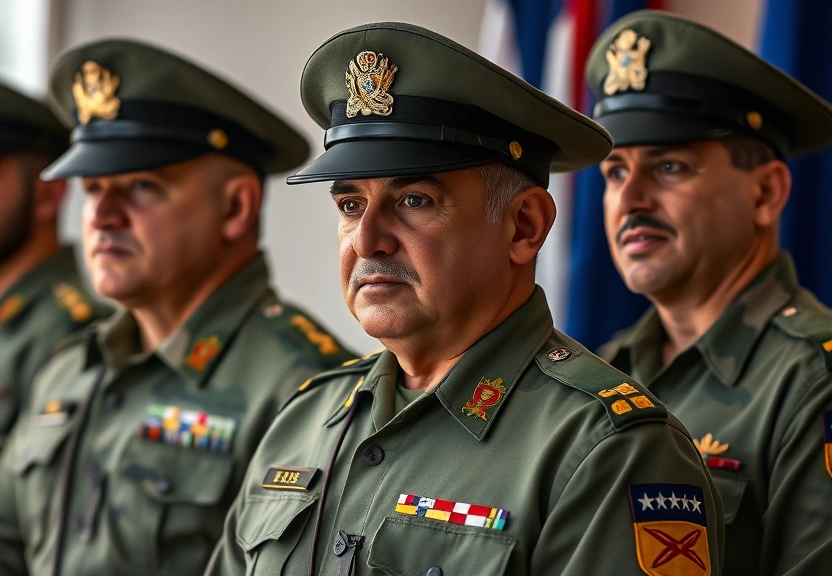Top Salvadoran Ex-Military Officers Sentenced for Wartime Killing of Dutch Journalists
In a landmark decision that underscores the ongoing quest for justice in El Salvador, a jury has sentenced three retired high-ranking military officers to 15 years in prison for their roles in the wartime killings of four Dutch journalists in 1982. This verdict marks a significant moment in the history of the Central American nation, as it addresses one of the most high-profile cases stemming from the brutal civil war that ravaged El Salvador from 1980 to 1992. The case not only highlights the violence of that era but also reflects the challenges of achieving accountability in a country still grappling with its tumultuous past.

The journalists—Henk Houtman, Hans ter Laak, Joop Willems, and Jan van der Heijden—were in El Salvador to cover the civil war when they were murdered. Their deaths shocked the international community and raised eyebrows regarding the treatment of journalists in conflict zones. The recent court ruling has reignited discussions about justice, accountability, and the struggle for truth in a nation still healing from decades of violence.
Context of the El Salvador Civil War
The El Salvador Civil War was a brutal conflict that lasted for over a decade, resulting in the deaths of approximately 75,000 people. The war pitted the Salvadoran government, supported by the military and the United States, against leftist guerrilla groups. Human rights violations, including extrajudicial killings, torture, and forced disappearances, were rampant during this period, with both sides committing atrocities.
Impact on Civil Society
The civil war had a devastating effect on Salvadoran society, displacing thousands and creating a culture of fear and repression. Journalists, in particular, faced immense risks as they sought to report on the realities of the conflict. The murder of the Dutch journalists exemplifies the perilous conditions under which media professionals operated during this turbulent time, often becoming targets due to their critical reporting.
The Case of the Dutch Journalists
The Dutch journalists were in El Salvador to cover the civil unrest and provide a glimpse into the human cost of the war. On March 17, 1982, they were abducted by military personnel, and their bodies were later found near a military base. The killings represented not only a tragedy for the families involved but also a chilling message to others who dared to investigate the atrocities committed during the war.
Initial Investigations and Challenges
For decades, the case of the murdered journalists remained largely unresolved, contributing to a pervasive sense of impunity. Initial investigations were marred by a lack of cooperation from military officials and a broader culture of silence surrounding wartime crimes. Many perpetrators felt emboldened due to the absence of accountability mechanisms, leading to a cycle of violence and injustice.
Recent Developments in the Case
In recent years, there has been a renewed commitment to pursuing justice for wartime crimes in El Salvador. This shift has been driven by a combination of civil society activism, international pressure, and a new generation of prosecutors willing to confront the past. In 2023, after years of legal battles, the jury delivered a verdict that shocked many but also brought a sense of closure to the families of the victims.
The Sentencing of Ex-Military Officers
The three retired military officers—General Rafael Flores Lima, Colonel Francisco Antonio Salazar, and Lieutenant Colonel José Antonio Rodríguez—were found guilty of murder and conspiracy. Each received a sentence of 15 years in prison, a decision that has been welcomed by human rights advocates and victims’ families alike. This ruling sends a strong message that those who perpetrate violence, even decades later, will be held accountable.
The Role of Justice in Healing
The sentencing of these ex-military officers is not only significant for the families of the Dutch journalists but also for the broader Salvadoran society. It represents a crucial step toward addressing the historical injustices that have plagued the nation since the civil war. The pursuit of justice is vital for healing and reconciliation, as acknowledging past wrongs is essential to prevent similar atrocities in the future.
Challenges Ahead
Despite this victory, the path to justice in El Salvador remains fraught with challenges. Many perpetrators of wartime crimes continue to evade justice, and the legal system faces numerous obstacles, including corruption and intimidation. Activists warn that continued vigilance is necessary to ensure that the momentum for accountability is not lost.
Important Points
- The verdict marks a significant step in the pursuit of justice for wartime crimes in El Salvador.
- Three retired military officers were sentenced to 15 years in prison for the 1982 murders of Dutch journalists.
- The case highlights the risks journalists faced during the Salvadoran civil war.
- There has been a renewed commitment to addressing past injustices in El Salvador.
- Continued advocacy is essential to ensure accountability and prevent future atrocities.
Frequently Asked Questions (FAQ)
1. What were the circumstances surrounding the murders of the Dutch journalists?
The Dutch journalists were abducted by military personnel while covering the civil war in El Salvador in 1982. Their bodies were later discovered, and their deaths highlighted the dangers faced by journalists in conflict zones.
2. Why has there been a delay in achieving justice for wartime killings in El Salvador?
Challenges such as a lack of cooperation from military officials, a culture of impunity, and political interference have historically hindered investigations into wartime crimes.
3. How does the sentencing of the ex-military officers affect future accountability in El Salvador?
The sentencing is a significant precedent that may encourage further investigations into other wartime crimes and signal to potential perpetrators that they may be held accountable for their actions.
4. What role do international organizations play in this context?
International organizations have been instrumental in advocating for human rights and accountability in El Salvador, applying pressure on the government and supporting local activists in their pursuit of justice.
5. What is the current state of press freedom in El Salvador?
Press freedom in El Salvador remains a concern, with journalists still facing threats and violence. The recent verdict may encourage a safer environment for reporting, but challenges persist.
Conclusion
The recent sentencing of three Salvadoran ex-military officers for the wartime killing of Dutch journalists is a testament to the enduring fight for justice in a country marked by a history of violence and impunity. While this verdict is a significant milestone, it also serves as a reminder of the ongoing struggle to address past atrocities and ensure accountability for all victims of the civil war. As El Salvador continues to grapple with its past, the pursuit of justice remains a critical element in fostering healing and reconciliation within society.
📰 Original Source
Este artigo foi baseado em informações de: https://www.cnn.com/2025/06/04/americas/el-salvador-officers-sentenced-killing-dutch-journalists-intl-latam


